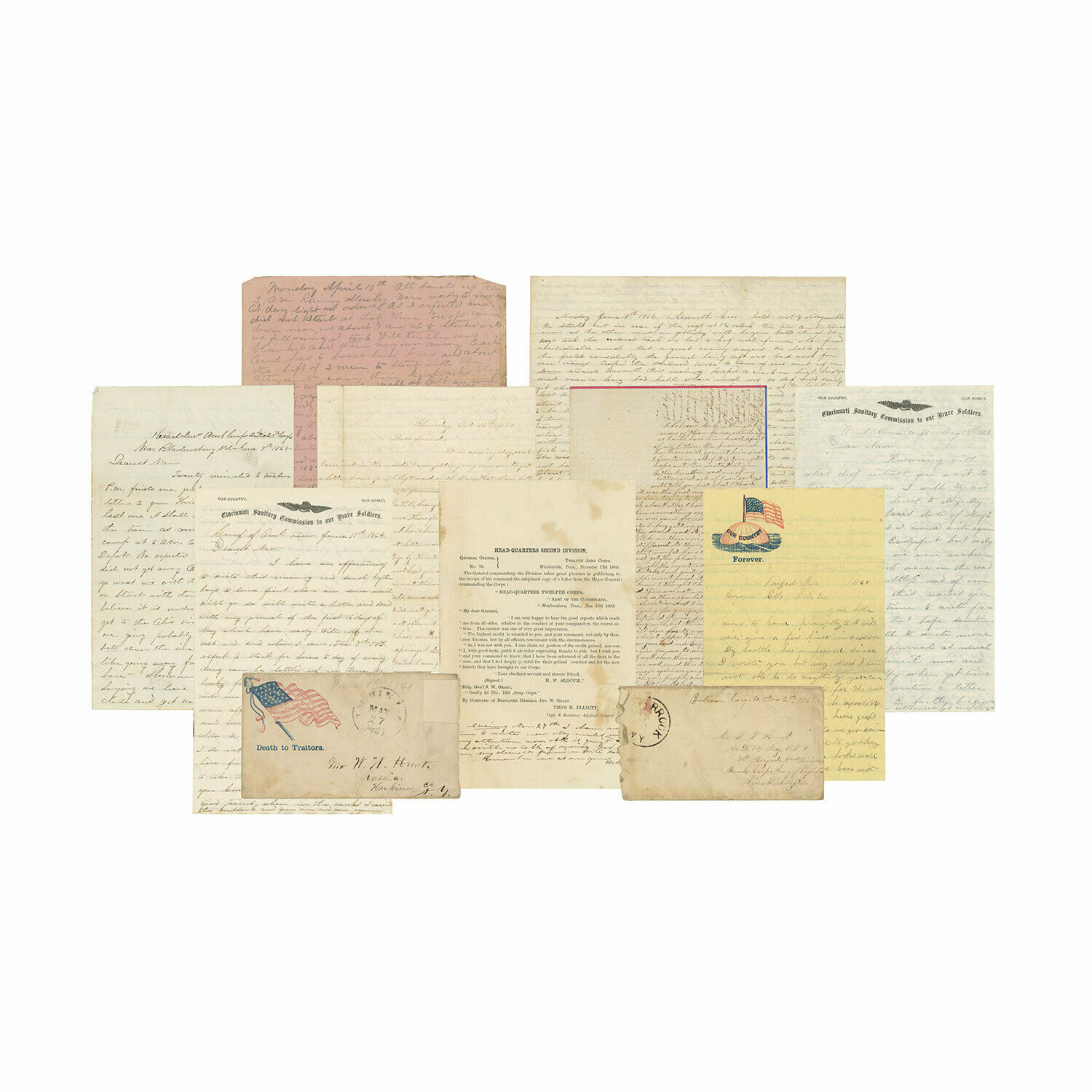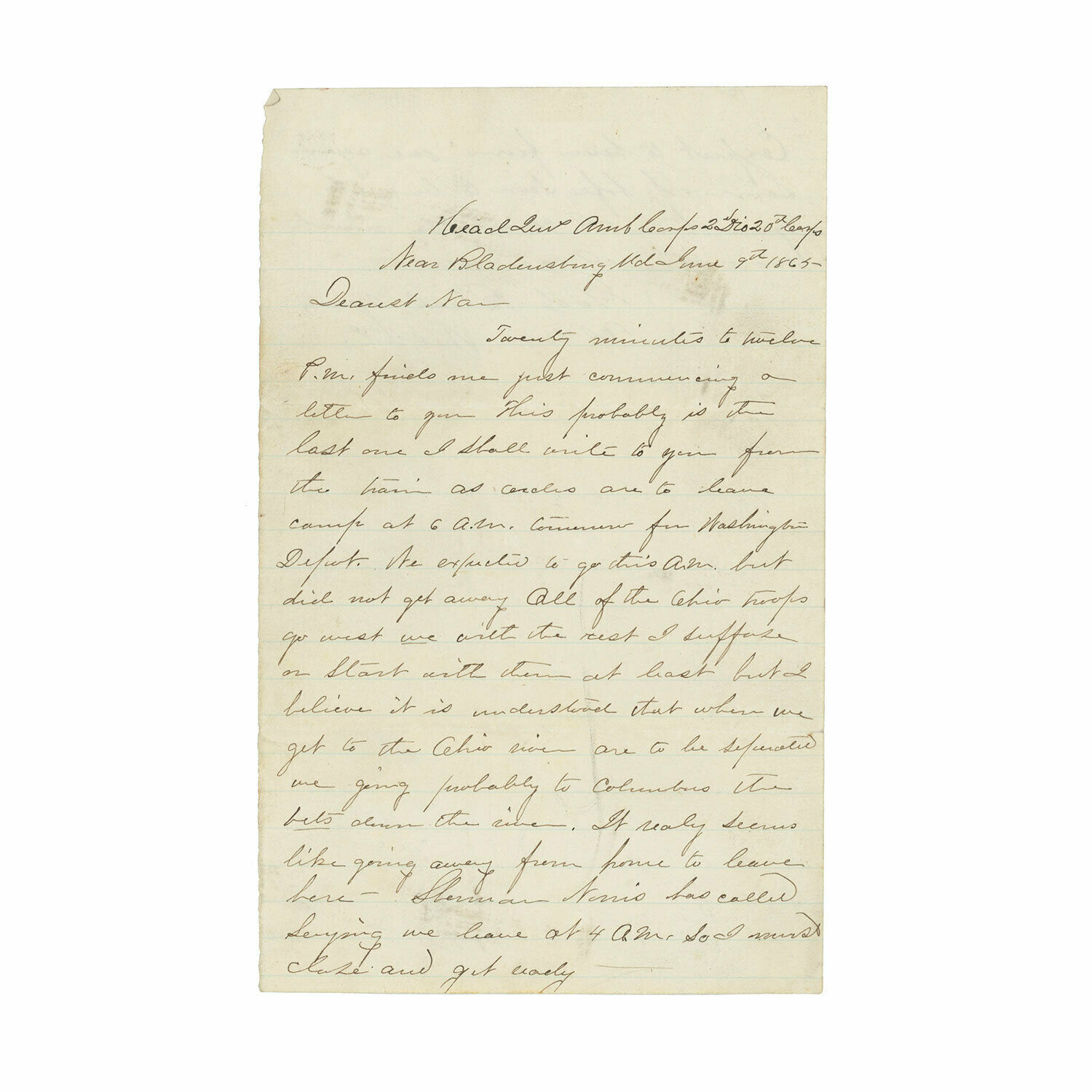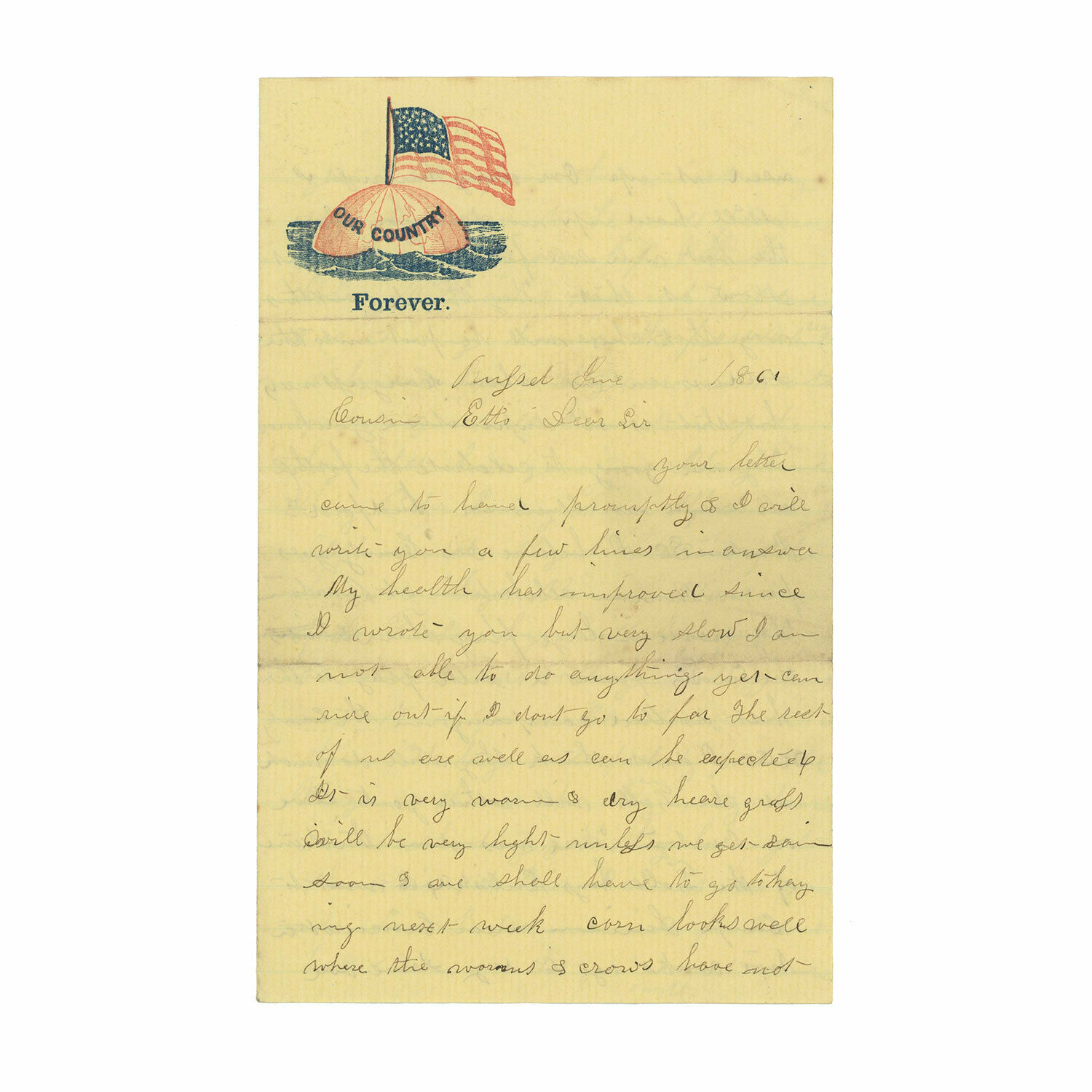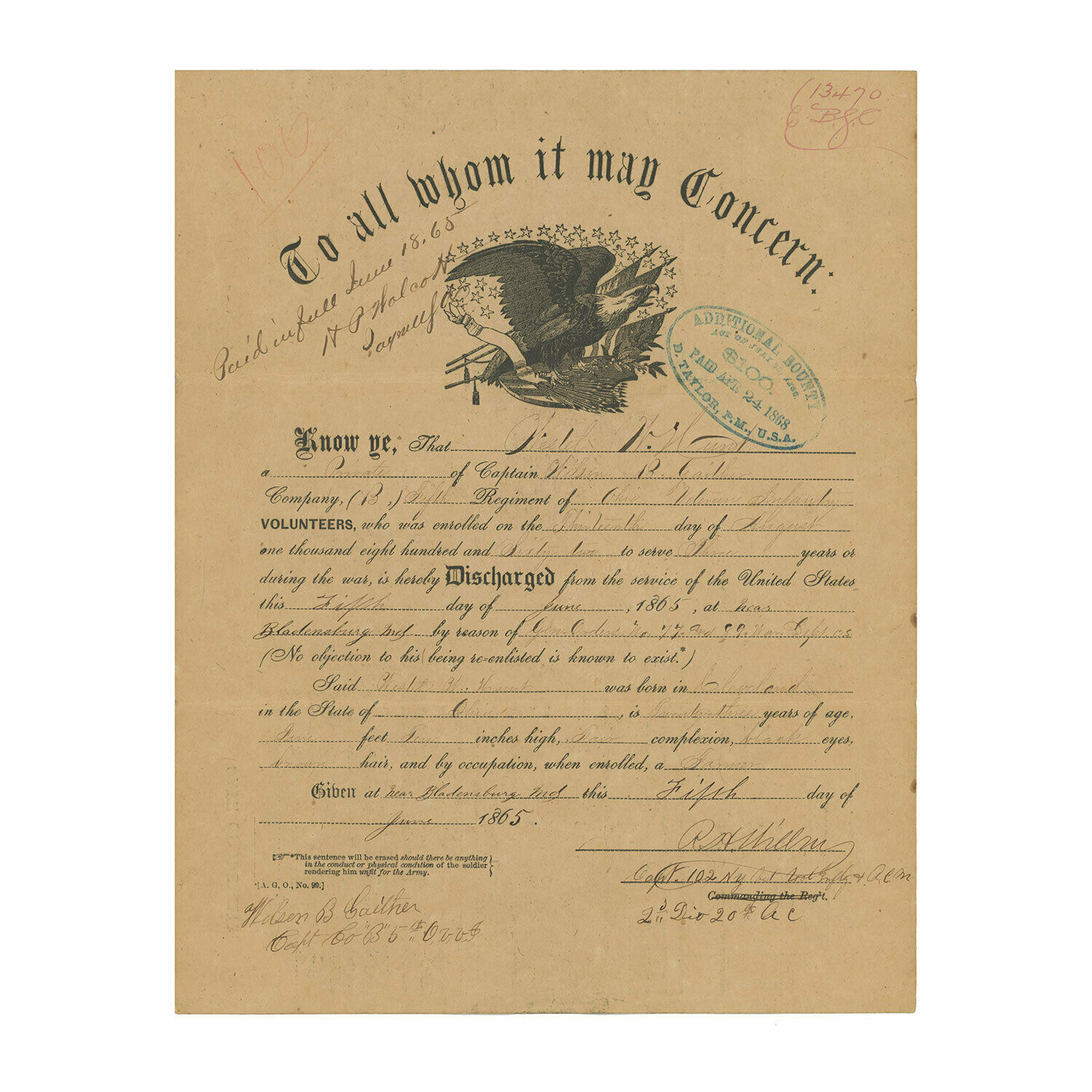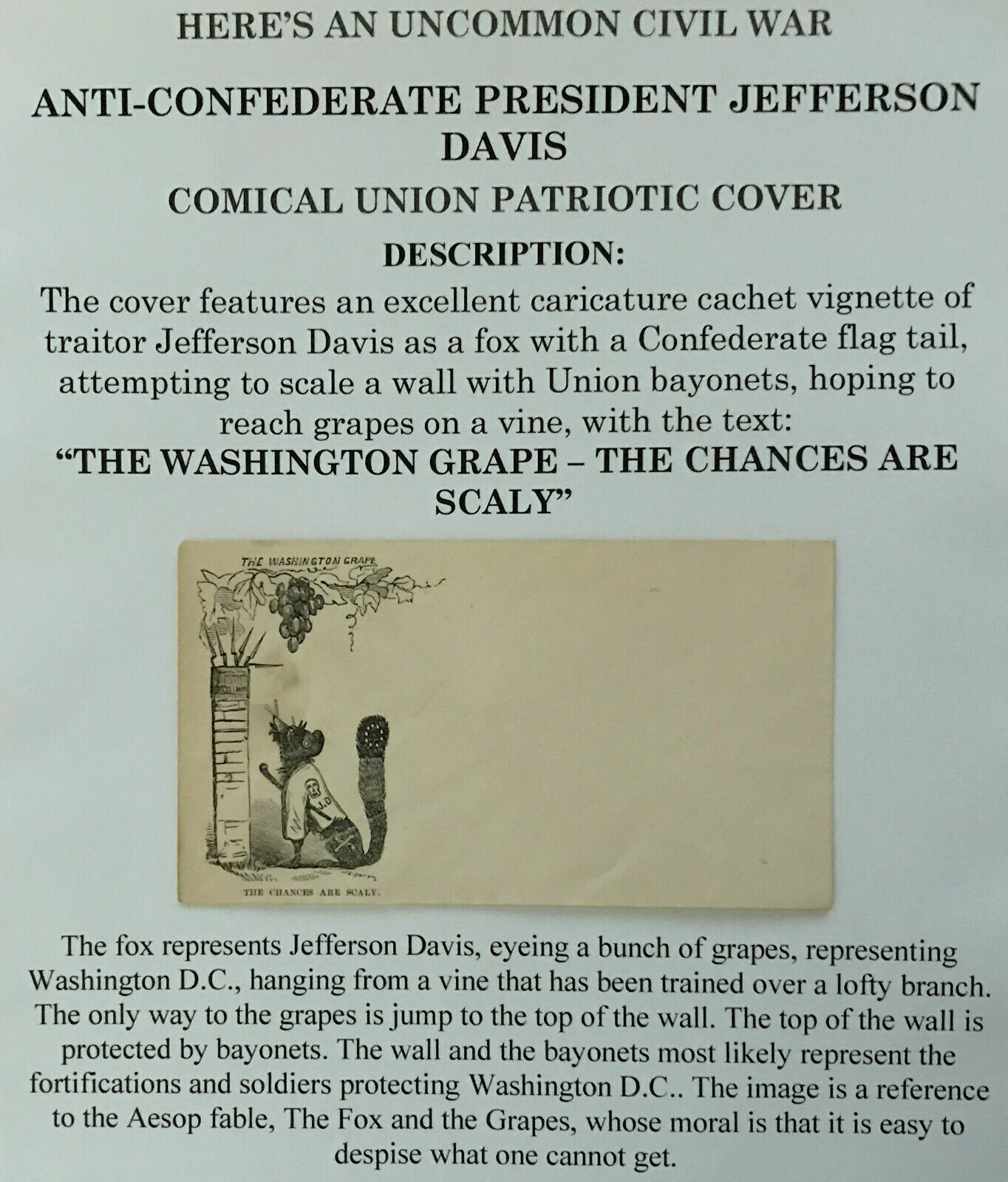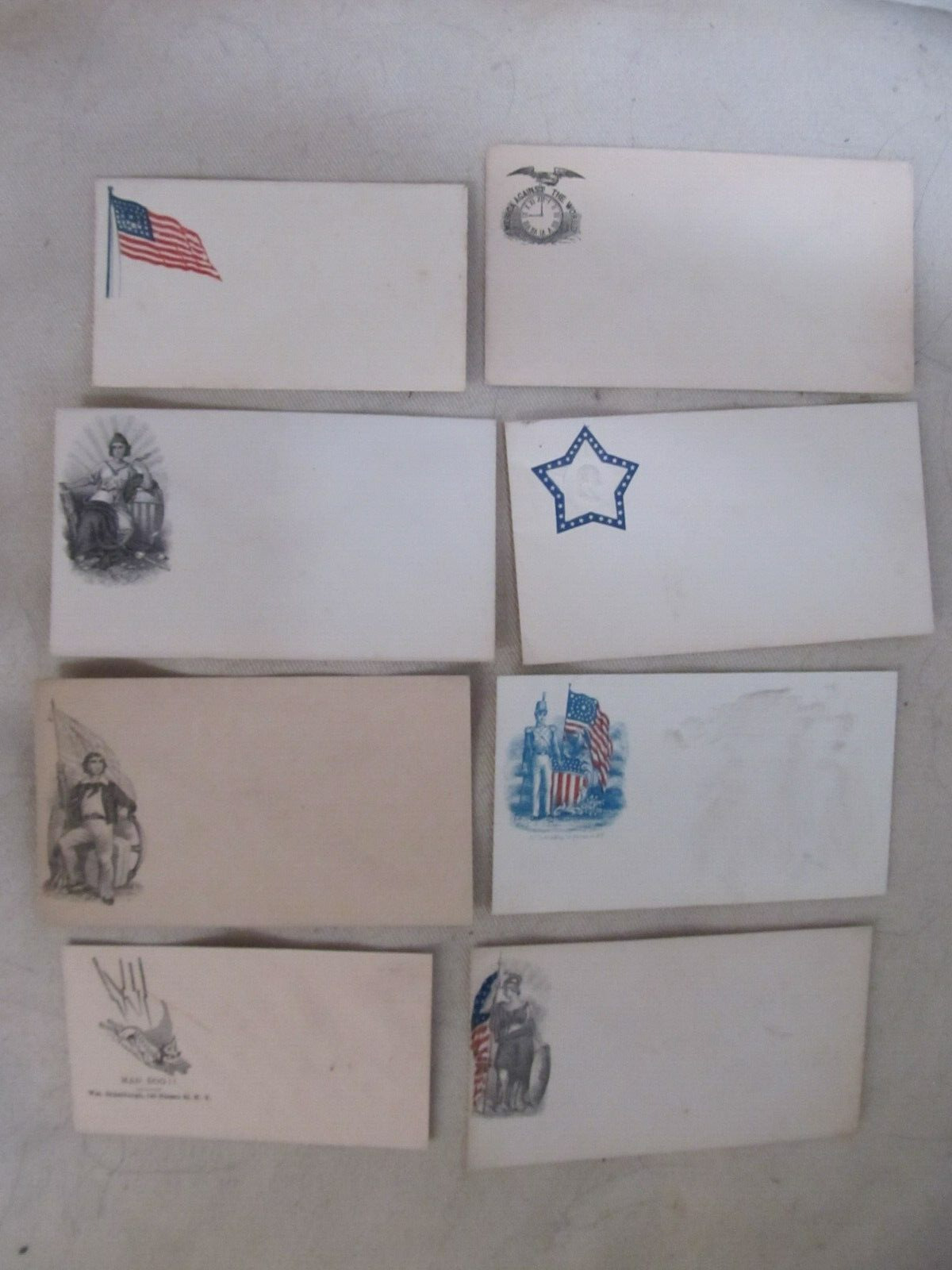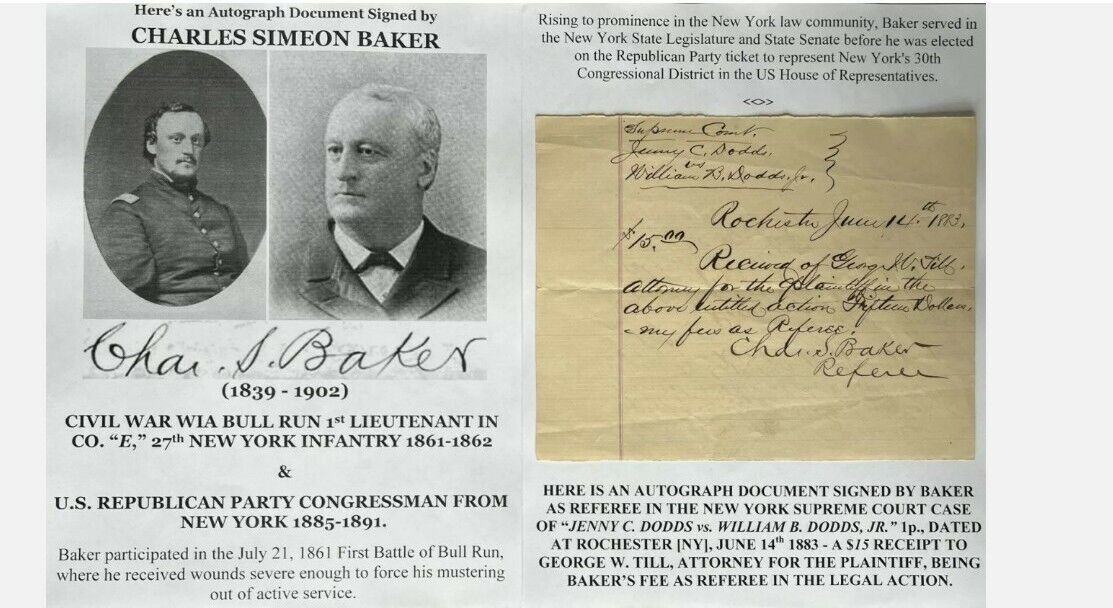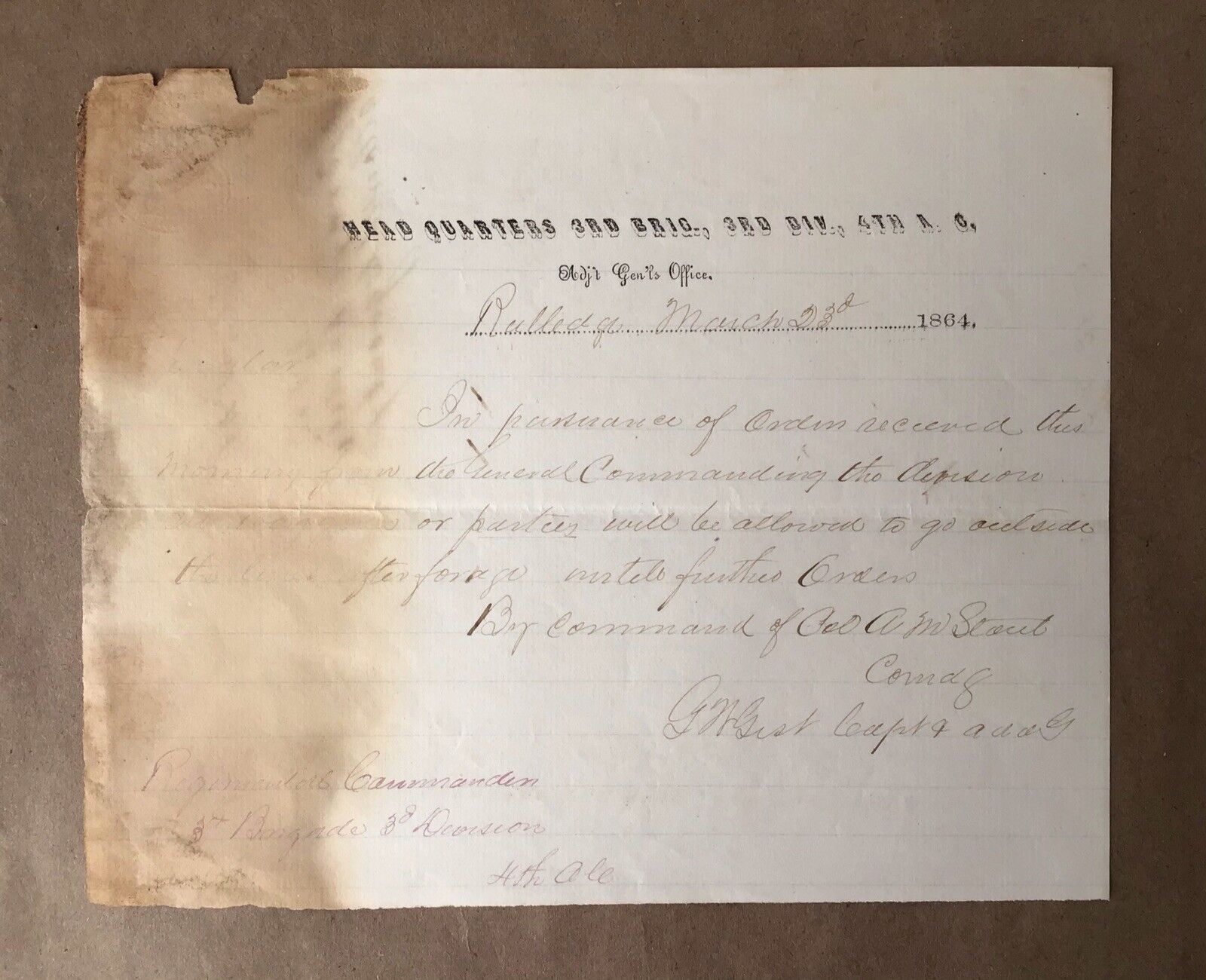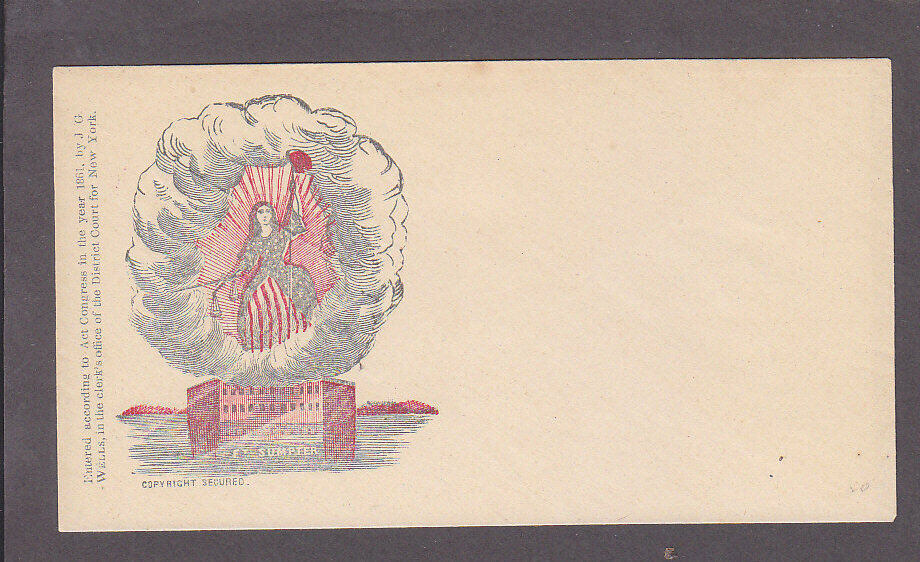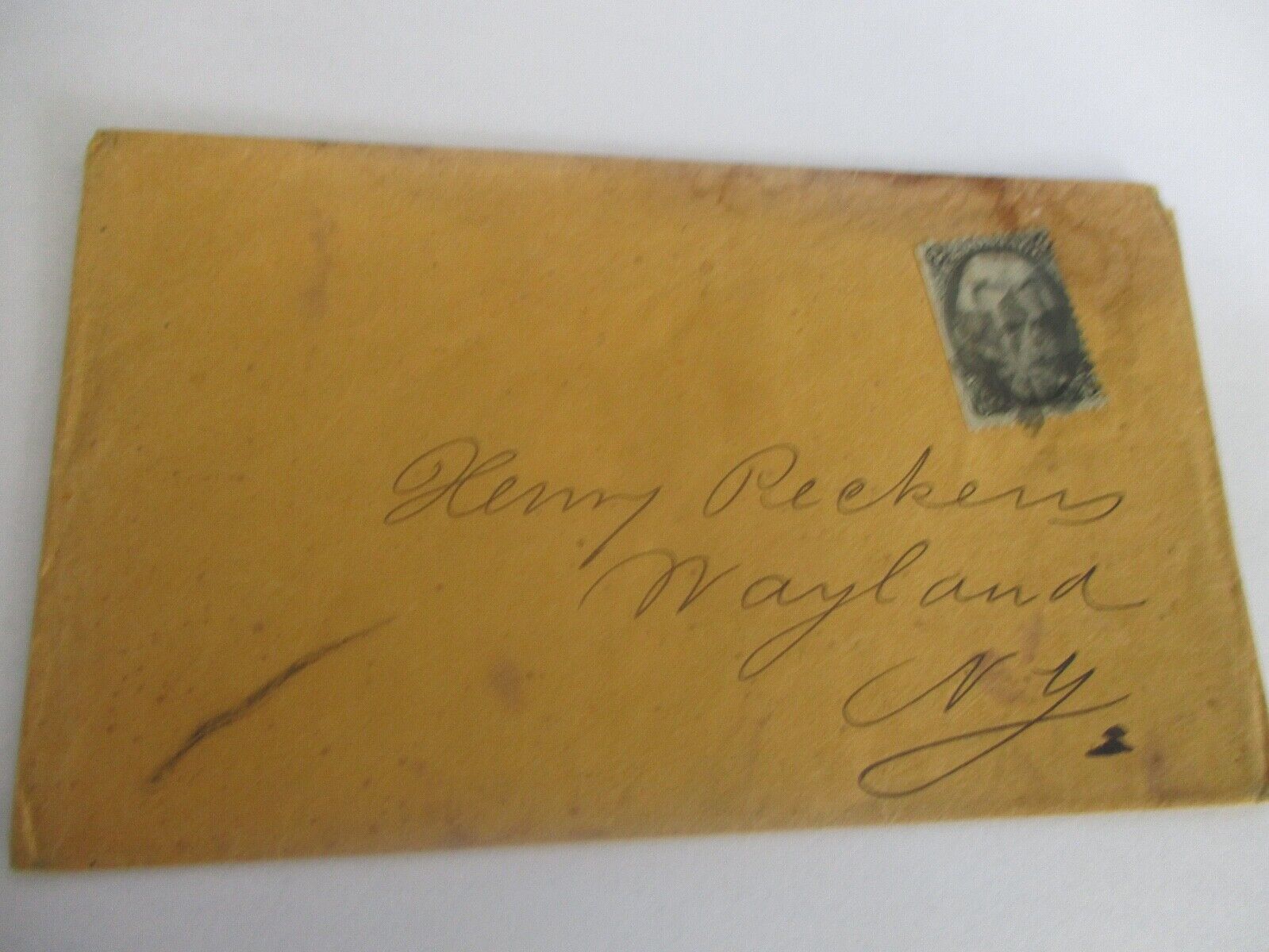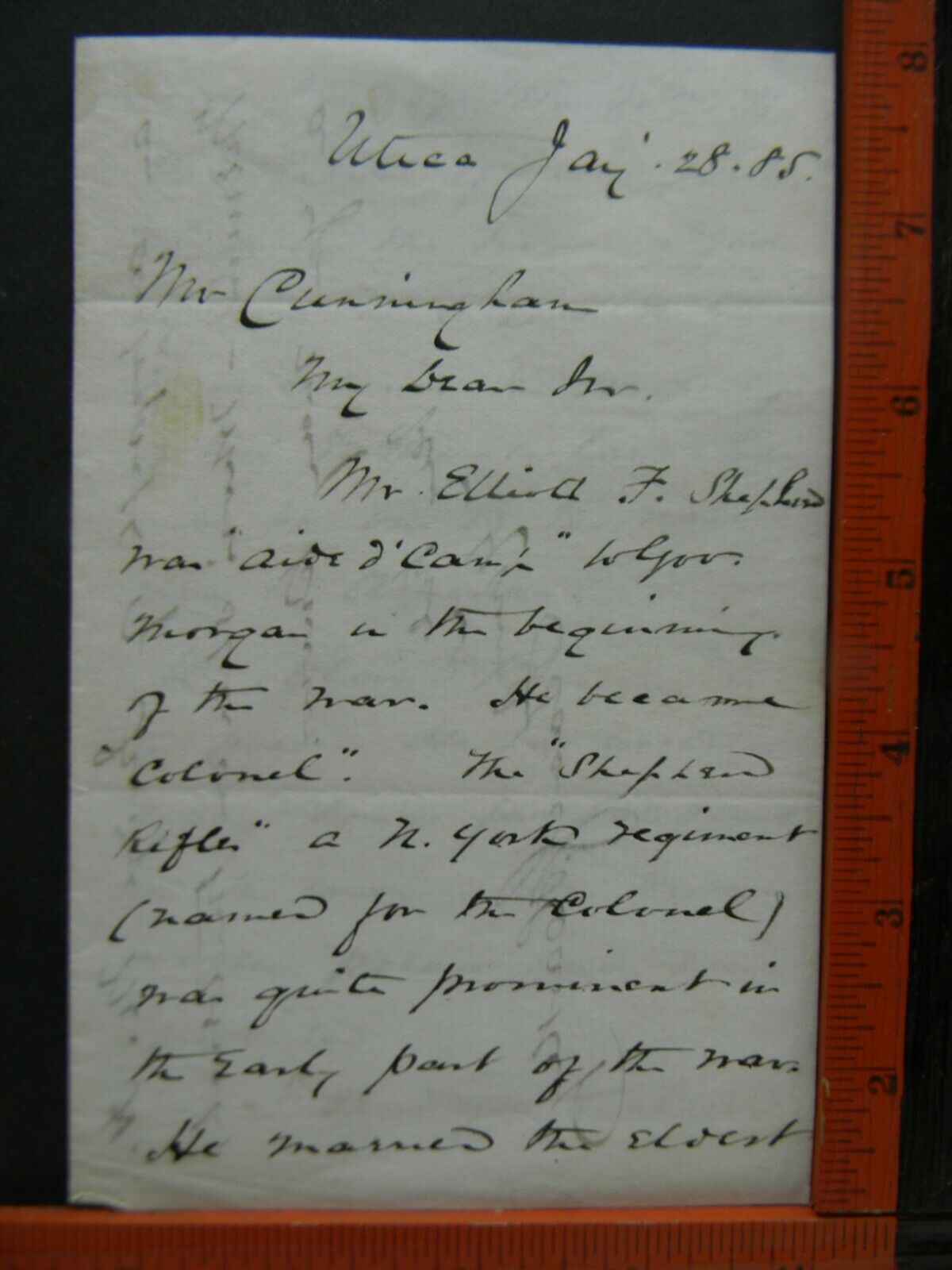-40%
Archive of Civil War Letters & Ephemera - Pvt Westel Hunt, 7th Ohio & 5th Ohio
$ 818.4
- Description
- Size Guide
Description
This archive features letters and diary entries written by Private Westel W. Hunt, whose unique perspective as an ambulance driver in the Union Army in the summer of 1864 through the end of the war—first with the 7th Ohio Volunteers and later with the 5th Ohio Volunteers—make for an interesting narrative. Most prominent in the archive are the six letters and journal entries written by Hunt himself between November 1863 and April 1864, in which he discusses troop movements, fighting at Ringgold, Gilgal Church, and Kennesaw Mountain, and details about the wounded men he transported in his ambulance. Also included are three war-date letters written to Hunt with two postal covers, as well as a large group of antebellum and postwar letters, documents, GAR programs, photographs, and other ephemera relating to Hunt (some of which was not photographed). The condition of the letters is good to excellent, with sizes ranging from 4 1/2” x 7” to 8” x 10”. Other ephemera in various conditions, but mostly good to excellent. See the list of additional items at the bottom of this listing.(The letters and diary entries are presented together chronologically. I apologize for the length of this description, but there’s just a lot of interesting detail here.)
The first item is a short note written by Hunt on November 27, 1863—the day on which his regiment was engaged at the Battle of Ringgold. Hunt, who had been wounded in the foot earlier that year at Chancellorsville, hastily scribbled six lines at the bottom of a field-issued victory order—a congratulatory message from Major General Henry W. Slocum to Brigadier General John W. Geary, praising the latter’s 12th Corps division for its “gallant conduct” at the Battle of Wauhatchie back in October. Hunt hastily scribbled six lines at the bottom of the order, indicating that he didn’t have time to write because his “mules need my attention now,” adding that “all is quiet around here with no talk of moving.”
The next item is a May 1864 letter written by Hunt on Cincinnati Sanitary Commission stationery. In it, he describes his movements before and after the Battle of Ringgold Gap:
Well we have been pretty busy lately. Went to Chattanooga from B[ridgeport] then took south below Ringgold to Dug gap (I think it is called) where our division had a fight. I had been sent to Ringgold with sick so was not there during the fight but came up the same night. Next day went to R. with wounded. Our division lost quite heavy. One regt 29th O.V.I. lost over 100 men. My regt were held in reserve and did not go in at all. During the last fight my division lost but a few men but 1st and 3rd lost heavy. It was busy times with
us
then. I think our boys must have been heavier than the rebs. Many wounded and dead rebs were found in the fields and woods after the rebs have left. I went across the battle ground the next day. Why they left is more than I can tell unless were afraid of being entirely surrounded. They had an almost impregnable position.
Predicting the outcome of the campaign, Hunt writes:
Sherman has an
awful
army here. I have no fears as to the result of the campaign. We left the battlefield Monday and since then have been following close after the heels of Johnston. We were camped night before last on the ground said to have been Johnston’s Head Qrs. The night before and until 2 o’clock that P.M. report says the 4th corps had a fight and captured nearly all his rear guard yesterday or the day before. It is now 12 o’clock Thursday. We have not moved today although our div. started out early. I do know the reason we remain behind. There is talk we have overtaken them again and is prospects of another fight. . . . I do not know near what place we are or in what county [we] are. I think on the flank partly of the rebel army. . . . One of the boys from Chagrin [Falls] who is in 103rd Ohio was killed here, another wounded. I supposed Johnston is making for Atlanta and we are following him. . . . Only a month remains for the regt. [in their enlistment]. One man was slightly wounded in the 7th—our entire loss. Hope we’ll be as
lucky
in every fight. We have cheering news from Va. But I must close as I think [we] shall move soon. Have heard a little cannonading today a long distance from here. God grant that we may be successful and the war may soon close. God bless you
dear
one
and may we be spared to meet again.
In a May 20 postscript to the letter, Hunt adds, “We came about 8 miles last night. Are now lying still today. Rebs are traveling as fast as possible. We are now in Cass County between Cassville and Kingston. The rebs were here yesterday.”
Hunt wrote the next letter in the group just a few weeks later on June 11. Like the previous letter, this one was written upon Cincinnati Sanitary Commission stationery. In it, Hunt writes that he will “write a little and send with my journal of the first 16 days of May,” indicating that he’s been in the practice of recording daily diary entries and mailing them home for later use. Two such “diary letters” appear later in this archive. Hunt then laments that “the 7th O.V.I. expect to start for home today.” The regiment’s original three-year enlistment term had ended and those first volunteers were on their way home. Those that joined the 7th later as recruits, including Hunt, had to remain on hand to complete their own terms:
We
lucky fellows, “recruits,”
are to be formed into one or more companies, officered by men appointed or chosen by Genl. Hooker, and remain here as a battalion of 7th Ohio or be transferred to another Regt. I do not know which. I expect to remain here for the present at least. May have to take the musket again sometime, but you know my rifle and I were on very good terms when in the ranks. I carried the knapsack and gun once and can again.
Hunt continues that “we are now about 4 miles south of Acworth, a little town on the railroad a few miles from Marietta. Have been lying here two or three days, but report is we are to advance again today. Do not know whether the rebs are in front of us here or not.” Near the close of the letter, he writes that “we do not know what is intended, but presume we will be very near Atlanta before many days. We hear the siege of Richmond has commenced. If so that is a doomed city I think.”
The fourth item is one of the lengthy “diary letters” mentioned previously, and is the most fascinating piece in the archive. Hunt had been in the habit of recording his daily entries on paper, and then mailing the completed sheets home for later use. This one covers June 13 through June 22, 1864. What’s fascinating about it is that Hunt gets into the nitty-gritty details of the movements of his ambulance, including the heavy skirmishing at Gilgal Church and, later, more fighting around Kennesaw Mountain. The most interesting passages follow:
Tuesday June 14th. . . . The sun has shone today so roads are drying again. Found our brigade where we left it but the train has moved through the breastworks and on to the right about a mile. Are in a good dry field near a nice spring and brook. Corps Head Qrs. Is nearby and 1st Div. (Genl. Williams) also. A part of our div. had taken up a new line and during A.M. our brigade followed also. Our boys are with the 5th [Ohio] now. . . . [Private Jacob] Ott has been sent back to regt.
I may go
next as I suppose they have no right to keep us longer in the train. Our boys are at the front again and building breastworks, I hear, about one mile from here. . . .
Wednesday June 15th. . . . About 2 o’clock we hitched up and followed our troops which were moving again. Followed along a long and strong line of breastworks built by our first division. Stopped in a field about 3/4 mile from where started and remained until near night. Our men have taken a high bare hill seemingly about two miles from here at the left. We can see our artillery plainly at work. I watched them some time. Very heavy skirmishing all along the line. The rebs have a strong position and seem inclined to hold it. . . . During evening 2 men of 29th Ohio were brought back wounded and I took them to hospital near where we stopped this P.M. The wounded were coming back quite fast so nearly all carried at least one load. . . .
Thursday June 16th. . . . Early this A.M. our teams were fed and breakfast cooking. Collins of company “C” is on detachment & now detailed in pioneer corps. Came back shot through the face and was taken to hospital just as my breakfast was ready some men were put into my wagon. I had to leave everything with Jack and go with them. Came back and eat my breakfast. Corp. Baptie, “F” Co, soon came wounded slightly in hip. He told me that Gerry Brakeman, “D” Co, was killed by a ball through his body. Dick Shepherd, also “D,” wounded badly in the shoulder. . . . G.B. has always been a good soldier, a true man to his comrades, and will be sadly, very sadly missed both here and at home. He leaves a wife and three small children of whom he thought much and seldom a week passed without writing and receiving letters from them. Soon I got a load and went to hospital. . . . I brought 2 Lieuts and one other man. . . . Our wounded now here is Charlie Wright “A” slightly in head, Collins “C” face, Dick Shepherd “D” shoulder, Baptie, Brewster, Bennet “F. I think of no others. About 5 o’clock I had to go out to front again with my ambulance. This time went out through the woods on a narrow road to near Genl. Geary’s hd. quarters. Marks & Val Wilson came with me. We relieved some ambulances then there. This P.M. the rebels shelled our artillery and several shell fall near here, the boys say. During the evening 2 of the batteries close by us opened on the rebels, firing several shots but received no response. . . .
Friday June 17th. Early this A.M. report came the rebs had left and we were to follow.
We
, the troops, took possession of the rebs works, forts and all, before breakfast. After
a while
Lieut. Stain came out and told us one team was to be sent back to hospital, the other two to go with the troops. . . . I carried a Lieut. . . and orderly Sergt. Payne, Co “F,” 29th Ohio. Payne and I are old school mates. . . . We brought 108 men in all today. About 9 o’clock were on the road again towards camp. I got very sleepy before got through. Had to drive all the way as
my
man
Jack
cannot see after dark, even to walk. . . .
Saturday June 18th. . . . About 8 o’clock went to hospital, were loaded and on road to Acworth again. I have one now from 28th P.V., one 111th P.V., one from 137th N.Y. Rained hard until noon. . . . The creek this side of town is so swollen we could not get over until had waited 2 or 3 hours for water to fall, as it had stopped raining and water falling in streams some. The bridge was high and dry, but ground on either side overflowed. When we crossed one side of bridge water came up near to wagon boxes, and such a road to take wounded over. We got over, however, all safe. Our loads put into cars and at 8 1/2 o’clock on the road back. The water had fallen so by this time had no trouble. 12 o’clock before getting back to camp. I got dry before leaving Acworth. Fighting going on all day at left of our camp. This shows the rebs have not gone far. Runner says Genl. Hooker is killed. . . . Heard fighting heard last night also, at the left of our lines. . . .
Sunday June 19th. . . . Everything wet and windy. At 11 o’clock loaded again.
Cleared
the hospital. This time I had 3 men who were on the sick list. Think they might have walked but did not say. We took the road tried to go yesterday. . . . Fighting still going on at the left. Seems about the same place all the time. The rebs seem both to give up and fall back further. Hear no confirmation of Hooker’s being killed, so will not believe it. . . .
Monday June 20th. The long looked for 20th of June has come at last, on which day the 7th, or at least the old members of that regt, expected to be
set
free
. . . . A large pile of gov. corn is near here. Some of boys brought away several sacks. I wanted to get some also, but thought it best to keep away. . . . Our command lay east of south much of this time, through woods with now and then a small clearing, with perhaps a log house &c in them. Passed several lines of breastworks. In many places the trees were pierced with bullets and cannon shot, showing that battle had raged there also. At the edge of a woods we passed two lines of rebel works built of logs and earth several feet thick. Have been built some time. Skirmish pits in front all clear in good style. About 3 o’clock our grain was unloaded in a grove near the negro quarters and dwelling of an old planter named Darby. These buildings had been used as hospitals. We were loaded with sick and wounded and went towards the front with them. This plantation I learn covers 1400 acres of land. The family and most of the chattels have left. Kennesaw mountain is in sight of here at the left. We could see shell bursts on it and see the flash and smoke of rebel guns, but is not near enough to distinguish any objects with the naked eye. Found Wilson at the plantation in charge of the sick. We carried them to Div. hospital 1 1/2 miles ahead. Went into camp near the hospital. Our corps are in reserve, I think. At any rate are not engaged for once. The fighting is very near here, both musketry and artillery. Rebel shell would reach us, I think, if should fire this way. Geo Oliver, Co. “H,” and Carson, “B,” badly wounded by sharp shooters a day or two ago. Oliver has a leg amputated. Carson piece of bone taken from his leg. The Darby Plantation is 6 miles from Marietta and 26 from Atlanta, so we are working down towards that doomed city slowly.
Tuesday June 21st. The firing was kept up with much spirit on both sides all night. The 4th Corps are engaging the troops on the mountain. The rebs charged on them once or twice, but were refused I learn. This morning the fight opened with renewed vigor. The ground was hotly contested. Our artillery, or part of it, was planted on a hill near the hospital. I expected to see shells come over into our camp from the rebel guns, but none came. . . . About 10 o’clock we hitched up and carried all of those who could not possibly walk away from the hospital, back on the road we came in, where we were out of reach of shells. A hospital was started and we unloaded there. We went into camp near the hospital. Standing on a hill nearby we could see our troops advancing through an opening in the woods to what seemed to be a line of breastworks. Saw them fire one or two volleys, then soon disappeared into the woods beyond. Firing kept up nearly all day, but little advantage seems to be gained on either side. . . .
Wednesday June 22nd. This A.M. carried the other patients from the old to new hospital. The part of them who could not walk are taken away for fear of being shelled, but no shelling took place there. So might have been left, although it is best to be out of range. Back in camp again and wrote a letter home and some in my journal. Heavy cannonading was kept up all night but has been more quiet today. Our division lie to the right of the mountain where most of the fighting is, so are not in engaged. The rebs still hold Kennesaw and seem inclined to remain there, although reports said Genl. Sherman intended to be in Marietta last night. Will have to get
Johnies
out
first
. . . .
The next item is another of Hunt’s journal letters, written the following spring at the close of the war. As part of Sherman’s army, Hunt and his comrades were then marching through North Carolina. On April 10 he wrote, “we leave here with a large force. Met the 15th & 17th Corps between our camp & town” and “kept nearly a southwest course all day” while the “rebs are in our front also.” On April 11: “Our div. in a line today. . . . Is a little skirmishing in front, but the Johnnies are falling back as fast as they can.” Then, on April 12:
The troops commenced cheering early this A.M. in every direction. I learned at length the cause. Lee has surrendered his army to Gen. Grant. It seems to be official. Gen. Barnum made a speech to his Brig. and when finished proposed a 3 cheers for Grant, which was given with a will. Gen. Geary made a short speech also. I never saw him in better spirits, says it is intended to take Raleigh and Johnston’s army and finish up the war by day after tomorrow. I think the war will soon be over. I expect to be home on the fourth of July. Everybody in good spirits. I hope we will succeed soon in capturing Johnston. We commenced moving about 8 o’clock. Passed through Smithfield, bands flying, colors flying, & a pretty situation, but all the buildings look old and dilapidated. Crossed river on pontoon bridge. Steep banks. Nothing of interest going on. I carried Will’s knapsack & gun 2 or 3 miles today.
The last of the letters written by Hunt is dated June 9, 1865, as the men are awaiting their transportation back to Ohio. “All of the Ohio troops go west,
we
with the rest I suppose. Or start with them, at last, but I believe it is understood that when we get to the Ohio river [we] are to be separated, we probably going to Columbus, the
vets
down the river.” Hunt refers here to the veterans of the 5th Ohio, most of whom were from the area around Cincinnati. “It really seems like going away from home to leave here,” he writes, but joyfully concludes, “I hope soon to be with you. Then I can tell much more than I can write.”
The remaining three war-date letters in the archive are written by other authors:
A June 1861 letter from W. E. Walters to Westel Hunt, written on patriotic “Our Country Forever” stationery, in which the author anticipates the coming July 4th celebrations around Cleveland. “I believe our county goes for a union celebration at Burton,” he writes. “The ladies present a silk flag to the best drilled company in the county.” The letter includes details about friends of theirs who had volunteered to fight with the 7th Ohio and other regiments.
The first four pages of a heartfelt October 1862 letter, possibly written to Hunt by a girlfriend: "
We have passed a very pleasant evening, but I have missed you
very
much, and when do I not miss you? I cannot mention such a time, but the thought of your absence, and danger, is more prominent when our friends are together, and all around me seem happy. I have tried to be happy with them, and have appeared cheerful. I will not be so selfish as to mar the happiness of others, by appearing sad and downcast. We live for others, not to ourselves alone, and I know I have friends who love me, and would grieve to seem me sorrowful. And tonight I certainly
ought
to be pleased, and even happy, for I see others who are so, and then, have I not heard that you are well, that you are not suffering what many others are at this time!"
The last letter is undated, but likely from the early part of the war. The stationery features an embossed bust of General McClellan. The letter is written to Hunt by a friend at home: "
How does Wilson enjoy religion now? I know he has made a profession, but have never heard much more. I feel an interest in him, because he is one of your friends and associates. I am sorry he is not strong and hope he may not lose his health entirely while he is there. I thought while reading about you carrying his gun, that you had enough, and more of your own, than I wished you to carry up a such a hill, but presume I should have done the same had I been in your place. I am glad you can endure so much, but wish it were not necessary, that you should.
It should not be if I had power to bring this war to a close
."
Additional items included in the archive:
Approx. 5” x 7” mounted oval albumen of a young man in civilian clothing (possibly Westel Hunt) with “Crobaugh’s Great Central Art Emporium,” Cleveland label on reverse
Hunt’s discharge from the 5th Ohio, dated June 5, 1865
1868 Ohio Adjutant General’s cover letter to Hunt that accompanied his discharge document
(2) small bound copies of “Constitution, By-Laws, and Regulations of the Seventeenths Regiment Association of the State of Ohio,” dated 1869
Small bound “Rules and Regulations and Rules of Order of the National Encampment of the Grand Army of the Republic,” dated 1884
Small bound program “Twenty-Fifth Annual Encampment, Department of Ohio, G.A.R., April 28, 29, 30, 1891”
5” x 7” bifold invitation to the 1912 Reunion of the 7th Ohio, featuring an engraving of Colonel William R. Creighton on the cover and a map of the Battle of Cedar Mountain on the reverse
5” x 8” leaflet, “Battles of Seventh Regiment, O. V. I.,” listing the 31 engagements the regiment participated in, as well as the additional 15 engagements of the 7th Ohio Battalion (attached to the 5th Ohio after the 7th’s original enlistments ended)
1908 postcard to Hunt written by former 7th Ohio comrade Schuyler J. Baker, inviting Hunt to a reunion of the regiment “to celebrate the Battle of Cedar Mountain”
1911 letter to Hunt from William F. Merriam (formerly Sergeant in 7th Ohio)
1911 letter on Pension Bureau form from a 7th Ohio comrade named “Lawrence,” referencing William F. Merriam
1906 letter on official GAR Norris Post 400 letterhead, directing Hunt to provide aid to a destitute comrade
1905 letter to Hunt from William H. Chapman (formerly of 9th Ohio Battery) which includes two photographs of Chapman and his wife
An undated wartime letter fragment mentioning the death of Russia, New York, native Ebenezer Prindle of the 121st New York, possibly an acquaintance of Hunt's wife
Various pension documents relating to Hunt
1865 teacher’s certificate of Hunt’s wife, Nancy C. Carpenter (d. 1921)
1881 letter written to Hunt’s daughter, Edith A. Hunt
(2) Geauga County, Ohio, treasurer’s office receipts to W. Hunt
Laminated 1920 clipped newspaper obituary for Westel Hunt
Several antebellum legal documents and deeds relating to Hunt’s father, Addison Hunt
Please see my other items for more interesting Civil War letters, documents, and images. I'm happy to combine shipping on multiple purchases.
Foreign shipping is provided through eBay's global shipping program.
